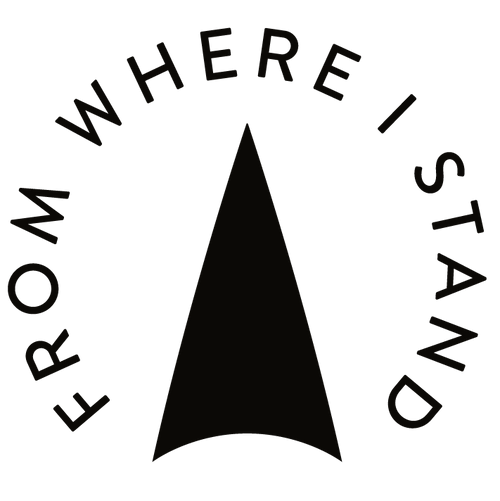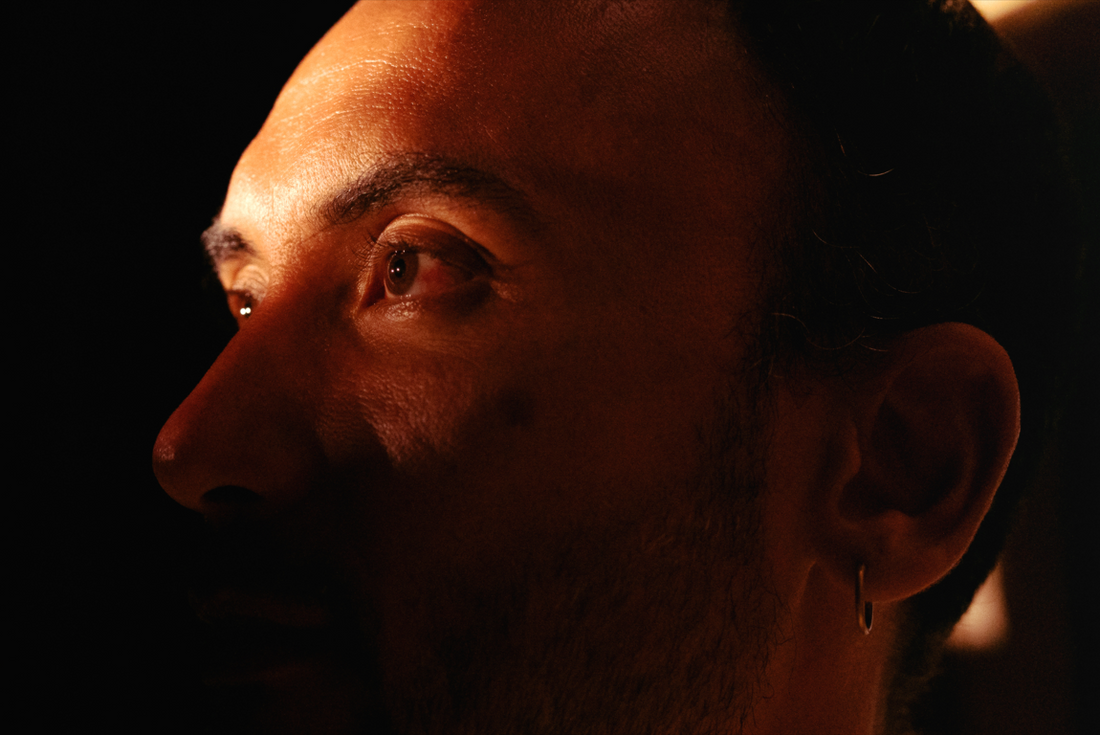Amidst the balmy Ubud air, ever-stretching rice fields and occasional gecko chirps, spirits remained high in a cozy little nook of a small patio at Pyramids of Chi. Clad in a short-sleeved tee and relaxed pants fresh out of a camping trip in East Bali, Laurent sat with us to talk about the magic of a sound healing experience called Light Sound Vibration (LSV), which he invented and develops on a regular basis—with light, sound, and vibration at the core of it all.

You had some brief stints in Berlin, Tokyo, and the US before Bali. Was it a long journey of finding a home and figuring out what you wanted to build What was the transition like?
I moved to Ubud around 11 years ago. Initially I came here to escape the winter in Berlin, where I was working on a startup project creating algorithms to analyze music to generate data and recommendations. I sold all my possessions, packed my bags, and came here. Nothing but a suitcase full of music equipment and another filled with clothes.
The first 2-3 years here I was only interested in music production and learning how to play didgeridoo, an Aboriginal instrument. I spent most of my time at home, growing my own food and doing yoga, meditating, and making music.
So, what’s the turning point?
Over time, I changed my focus to wellness. I thought about developing music for the inner experience, which is related to a psychedelic experience. The idea was to put speakers on massage tables, play music to people with their eyes closed, and take them on a journey. It was similar to the outer experience where you would go to clubs and festivals and experience the lights and sounds. I wanted to do that in such a way that it’s bringing you into a relaxing state instead.

Why Ubud?
I was attracted to Ubud because it’s easy to have a healthy lifestyle over here. I was drawn to the local Balinese culture and the good weather, having lived in Berlin before.
How did you first come up with Light, Sound, Vibration?
I wanted to create an experience incorporating lights, sounds, and sensory stimulation to take people into a trance state. I didn’t expect to bring about a product or service, it was just something born out of what I loved to do. I wouldn’t call it a sound healing experience per se, but more of an immersive experience. Only when I introduced it to Pyramids of Chi that it became well-known as sound healing therapy. From there, the project evolved. But I still mainly do it for music and art.

What are some other things that influenced you—history, science, modern art?
When I was a teenager I wanted to be a zen Buddhist monk. I got interested in art, music, spirituality, and eventually creating immersive audiovisual events. More than 10 years of doing that, can you imagine?
So what do you want people to experience? What’s the takeaway?
I don’t want to try to push anyone in any direction. If they enjoy the experience, that’s already the first step. What’s even better is if they have this feeling of awe or wonder, where they experience something very beautiful or profound. If it happens, it takes you out of your usual self. Kind of like an expansive state. You don’t need to worry about the physical experience, as the lights are taking over
your visuals and the sounds your auditory feel. From there, you get clarity from your subconscious.
What are your thoughts about all these other sound healing programs that started to pop up?
I think it’s a good thing that more and more people are interested in wellness. I don’t really concern myself with what other people are doing.
Is it becoming saturated, though?
LSV is the only thing that brings art elements and fuses technology at the same time. It’s bridging art, science, and spirituality altogether. Globally, there’s more interest in wellness than ever before, with all these things happening in our world post-Covid—and with the situation that’s taking place, more people are becoming prone to mental health issues. They begin to question their purpose in life.

Any interesting feedback from people who tried LSV?
People have had visions due to the combination of lights and sounds—it puts them into a lucid dream state. They’re awake and dreaming at the same time. The goal is to put you as close as possible to sleep, but stimulating enough that you’re conscious but you can tap into your subconscious. Only 5% of human brain activity is conscious, and the other 95% isn’t. So 95% of all cognition, all the thinking that drives our decisions and behaviors, occurs unconsciously. How do you explore that and take control of your life?
From there, you can understand how your own system works. It’s possible to have an emotional release out of that, e.g. crying or having a burst of energy. Or, you could be falling asleep and getting some sort of insight or clarity about things. We spend a lot of our energy holding on to things, and we tend to suppress it. Once it gets out, your body or being will try to process it in multiple ways.
As for me? I do it to get clarity of things, to slow down my mind and deepen my intuition, so I know what to do next. Intuition is a form of intelligence you can only access when your mind is quiet and still, otherwise you’re just reacting to things.
Fascinating.
Yes, and I’ve even had people who communicated with their dead relatives. The other crazy thing was when these two people who didn’t know each other had a telepathic experience. Somehow they were tuning in to the same frequency, which created a pathway for their consciousness to connect. It has been said in quantum physics that consciousness comes from one source, then it is split into
different bodies but ultimately we are all connected into one. Fascinating stuff.

Can you tell if it’s their first time?
We ask people, haha. The more you go, the more you are used to these kinds of states. Your mind is different every time, as we are changing every day. Depending on the intentions you set, you might access something else each time.
It’s important to not have any expectations. Rather, be open to it and surrender. You can set intentions to know why you are there, planting a seed and watching things manifest itself in the coming days or weeks. It needs time to grow.
Let’s talk about music. You did some music production and events too, including Rainbow Disco Club. How did that influence your work in sound healing?
For me, events are immersive experiences that combine multimedia arts and music—from the moment people enter the venue, they become transported into an experience. So we’re sort of curating the senses through the space, decoration, visuals, and music. It’s like lying down with your eyes closed.
I’m not a pro when it comes to music production or mixing, but I understand enough of everything to be able to work with professionals or like-minded individuals. I’m not doing everything myself. I don’t have all the time in the world to dedicate myself to, let’s say, sound engineering. I’m more interested in creating unique experiences with all the elements combined and drawing from many inspirations.

I think it’s one thing to like, be good at something and another to just be and absorb everything you can to discover what you love doing.
Yes, that’s another way to put it.
What’s next in store?
I spend most of my time now conducting research and development to improve the experience. I’m in the process of expanding to other countries and platforms— creating an app, developing a new system, curating music programs, working to measure brain waves and heart rates during sessions, starting a research project using AI to understand how sounds or vibrations are affecting your psychophysiological state, and finding a way to reverse-engineer that.
My goal is to create a generative experience where one reacts to a person’s inner state in real time. Essentially, the music will be composing itself and guiding them to a certain intention, like putting them to sleep, for example. It can go many ways, really. Like bringing them to a state of trance, or energizing them.
How does culture and diversity affect the experience–in a way that others from different backgrounds might react differently than the average person?
In a city, for example, sound healing has to be more functional and scientific because it is designed to fit into people’s lifestyles. People need to unwind after a long day at work, and we need them to come in regularly. Next step is to work on integrating more therapeutic practices, physical recovery, stress relief, what have you.

Are you saying there needs to be a sense of progression?
Exactly. Think of meditation—the more you do it, the more you benefit. I don’t think it’s possible to not have any thoughts while you’re at it. They are always passing, but you can observe your thoughts and understand how your mind works. What I’m creating is a quicker way for people to switch off. You don’t need to practice meditation for a year before you start to feel something, you know? Over time, people are progressing this way.
What’s a quick fix for someone who never got into meditation like me, then?
Sit quietly for 15 minutes. Give it a try.
You’re known as many things, wearing many different hats. What do you want to be recognized as?
I’m not really putting myself out there. For me, it’s mainly about art or my creative process, and not so much about helping people. I’m aware it’s creating a ripple effect and people have been benefiting a lot from my work, and ultimately it gives me motivation to continue doing it. My mission is not really to change the world, though.

How so?
The question is more like: from what place is it coming from? If everyone does what feels most authentic to themselves, then everything will be better.
Alright. What’s your favorite way to move your body?
CrossFit every day and yoga. I also organize ecstatic dance sessions once a week. Your mind receives chemicals from your body, so that’s why I exercise. I’m more focused that way.
A day in the life of Laurent Svara?
Depending on how busy I am, I wake up between 3-5 then meditate or do Qi Gong first thing in the AM. Then I work on the most difficult tasks until 8, and yoga or CrossFit after that. I don’t eat heavy meals until the evening, so I usually have light breakfasts or snacks. Then I spend my time in the afternoon doing creative work or attending meetings, eat dinner at 4 or 5PM, and as for the rest of the day I do whatever I want.

Favorite things to do in Bali?
Working, mostly. But I like to immerse myself in nature and go on trips, at least once or twice a month. Like the camping trip last night. Sometimes I still DJ once a month.
Anything to recommend–food and drinks?
I like Alchemy, Seeds of Life, and Plant Bistro. Locavore is great for quality meats. Maybe The Lair for drinks.


